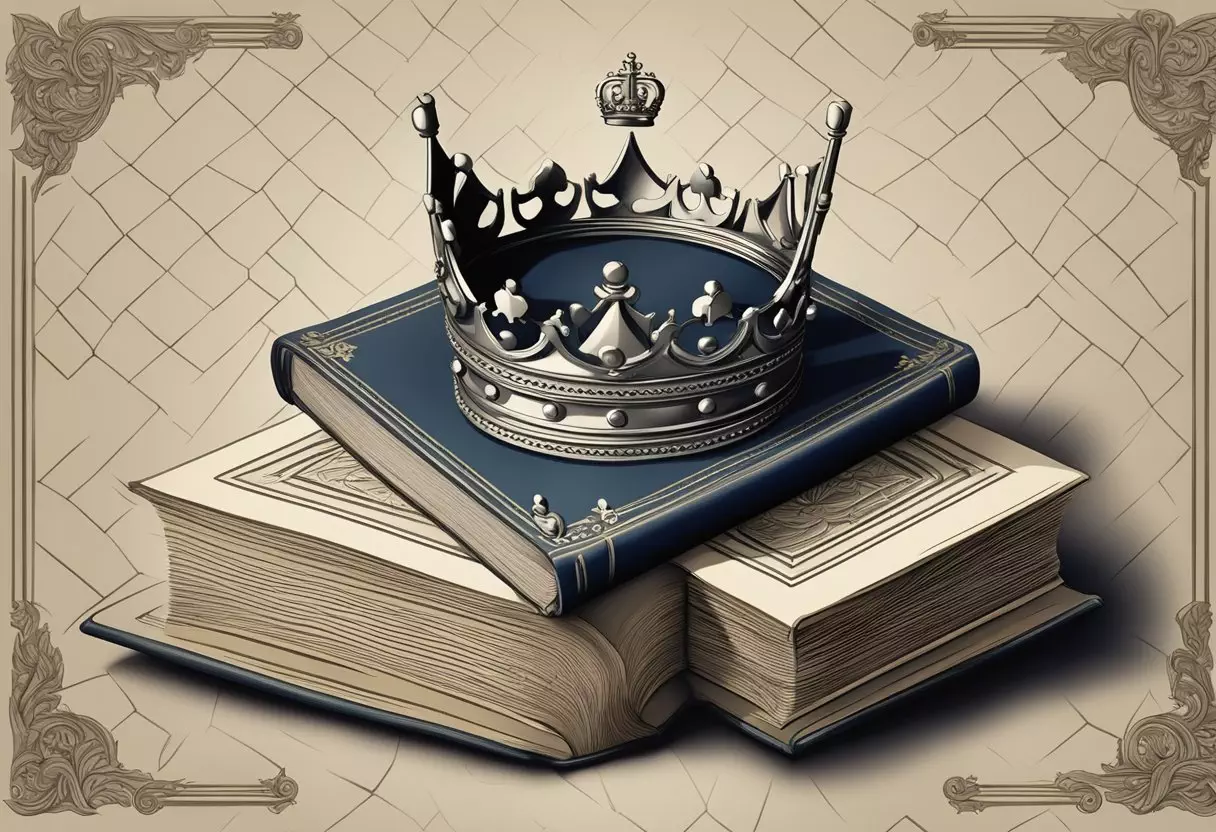Baby Name Arthur: Unveiling the History and Popularity
Choosing a name for your baby is a significant decision, and you might be considering the name Arthur for its classic and enduring charm. Arthur is a name of Celtic origin, commonly associated with the legendary King Arthur of the Knights of the Round Table. The meaning of “bear” adds a touch of strength and nobility to the name, which may be one of the reasons it has remained a popular choice for centuries.

The name Arthur has seen a resurgence in popularity, striking a balance between historical depth and modern appeal. It’s a name that carries with it a sense of distinction and a classic vibe that never truly goes out of style. Whether your interest in the name stems from its Arthurian legend connections, its Celtic roots, or the way it rolls off the tongue, Arthur could be a fitting choice for your baby boy.
You might also appreciate the name’s international flavor, as Arthur has been embraced by various cultures and languages, each adding their own spin to its pronunciation and use. Given its versatility and time-honored status, Arthur could provide your child with a name that is both grounded in history and broad enough for them to carve their own unique identity.
Table of Contents
Historical and Cultural Significance
The name Arthur carries with it a weight of history and cultural importance, reaching back into the depths of legend and extending through various notable figures over time.
King Arthur and Mythology
The name Arthur is inextricably linked to the legendary King Arthur, a quintessential figure in British mythology. Often hailed as the epitome of chivalry and nobility, King Arthur is best known for his supposed leadership of the Knights of the Round Table in the defense of England from Saxon invaders. The narratives of Arthurian legend have Celtic roots but were expanded in the romances of medieval England, blending myth with possible historical elements related to the Roman Artorius.
Prominent Arthurs in History and Culture
Throughout history and culture, there have been many prominent individuals bearing the name Arthur, contributing significantly to their respective fields and solidifying the name’s illustrious reputation. For literature, you might explore the works of Arthur Conan Doyle, the creator of Sherlock Holmes, or delve into the science fiction realms of Arthur C. Clarke, who foresaw technological advances in his writing. Within the realm of the arts, Arthur Miller, the renowned playwright, left an indelible mark with classics like “Death of a Salesman.” In the world of poetry, the creativity of Arthur Rimbaud continues to be celebrated. Moreover, the philosophical insights of Arthur Schopenhauer have transcended time, influencing existential thought. In sports, the legacy of Arthur Ashe as a tennis great and civil rights advocate remains powerful.
The name’s staying power has been bolstered by its use by royals, such as during the Victorian era, when Queen Victoria named her third son Arthur. From its ancient Celtic origins to its ascent in noble lineages, this name has been threaded through many layers of history and culture.
Meaning and Origin
When you think of the name Arthur, images of legendary kings and noble knights might come to mind. But the name carries deep historical roots that connect to Celtic, Welsh, and possibly Latin origins, with meanings associated with “bear” and “strong man.”
Etymology
The etymology of Arthur is quite fascinating, as it draws on various languages and interpretations. Historically, the name is believed to have a Celtic origin, where “artos” signifies a bear, a creature revered for its strength and nobility. In Welsh, “arth” means bear as well, which supports the Celtic connection. Some scholars also link Arthur to the Roman name Artorius, which may have influenced the name’s development. However, the direct origin remains somewhat elusive, with connections to words for “bear” and “man” or even “king.”
- Celtic: Artos (Bear)
- Welsh: Arth (Bear)
- Latin: Artorius (Possible link)
Name Variations Across Cultures
Arthur has been adopted and adapted across different cultures, with slight variations in its spelling and pronunciation. In Irish lore, you may find it spelled as Artur, while in Welsh traditions, it might be seen as Arthwr or Arth. These different renditions all trace back to the central theme of strength and nobility associated with the original meaning of the name.
- Irish: Artur
- Welsh: Arthwr, Arth
- Latin Influence: Artor
Each variation of the name Arthur brings its unique twist, yet they all circle back to the core qualities that have made this name timeless and robust. Whether you connect with its association with bears, historical leaders, or the mythic Thor, Arthur remains a name with a strong presence and enduring appeal.
Name Usage and Trends

When you choose the name Arthur for your baby, you’re selecting a name with a regal resonance and enduring popularity across various cultures.
Geographical Popularity
In England, the name Arthur has experienced a revival, often associated with royalty and the fabled King Arthur. This name enjoys a steady popularity in England, often making it onto lists for potential names for young British princes, signaling its noble stature among British families. The USA also saw a rise in popularity of the name Arthur in the early 20th century, with a notable peak in usage around 1912.
In Europe, Arthur maintains a presence with variations like Arthur in French and Artur in Polish and German speaking countries. The use of Arthur in Spanish-speaking nations is less common, but the name is nonetheless recognized due to its widespread historical and modern-day usage.
Historic and Contemporary Trends
Historically, Arthur surged in use during the Middle Ages, inspired by tales of King Arthur and his knights. This underscores the name’s staying power through centuries as parents continue to be drawn to its blend of mythological gravitas and gentlemanly charm.
In more contemporary times, the name Arthur has seen a cyclical pattern of popularity. In the USA, the name Arthur gained significant popularity in the year 1912, indicating how name trends can fluctuate significantly over time. Over the years, as vintage names became trendy again, Arthur began to regain some of its former luster.
Talking about sibling names, parents often pair Arthur with equally timeless and classic names, indicating a preference for cohesive name themes within families. Arthur can be comfortably paired with names like William, reflecting a trend where traditional names are chosen to complement each other.
Whether in Latin-derived cultures or elsewhere, Arthur as a baby name retains a classic and timeless appeal that crosses borders with ease, making it a versatile choice for your little one.
Name Aesthetics and Associations

The name Arthur offers a nostalgic charm and a wealth of cultural references that you might associate with timeless literature and enduring artistry.
Literary and Artistic References
Arthur Miller: An iconic American playwright, known for his significant contributions to literature including the classic play “Death of a Salesman.”
Sir Arthur Conan Doyle: As the creator of Sherlock Holmes, his name is synonymous with mystery and adventure.
Arthur C. Clarke: A prominent science fiction writer, who penned the novel “2001: A Space Odyssey.”
Artie: A friendly diminutive often used in literature and film that hints at a creative and artistic character.
General Associations and Symbolism
King Arthur: Your mind might conjure the legendary British leader, central to numerous mythic tales and seen as an ideal of chivalry and nobility.
Thor and eagle: The name Arthur, in some interpretations, is linked to Thor, the Norse god of thunder, and the eagle, both symbolizing strength and leadership.
Arturo: A variant used in many cultures that signifies a son or an heir, often associated with themes of continuation and legacy.
Practical Considerations in Naming
When you’re considering the baby name Arthur, it’s essential to think about how the name will fit with various aspects of your child’s identity, including the surname, potential nicknames, and its cultural suitability.
Compatibility with Surnames and Siblings
Choosing a first name that harmonizes with the surname is an important task. You want to ensure the name flows well and that the combination doesn’t create any unintended meanings. For example, with a name like Arthur, which ends in an “r”, you might want to avoid surnames that start with an “r” to prevent a jarring repetition of sounds. The syllable count can also affect compatibility—Arthur is typically a two-syllable name, so it pairs nicely with both shorter and longer surnames.
When considering the fit with siblings’ names, you might look at names that share a classic vibe, such as Alexander, Oliver, or Theodore for boys, or Matilda, Charlotte, Alice, or Eleanor for girls. This creates a cohesive sounding group.
Potential Nicknames and Variations
Nicknames are often an inevitable part of having a name, whether you plan for them or not. For the name Arthur, common nicknames include Art and Artie. Thinking about these shorter variations can be useful, especially if they might work better in day-to-day use or fit more comfortably with your name structure preferences.
You should also consider the gender neutrality of nicknames and variations. While Arthur is a predominantly male gender name, some nicknames can be more unisex, providing flexibility. A nickname generator can provide additional options if you’re struggling to find the right one.
In multicultural environments, like many African American communities, there’s a trend towards unique or culturally significant names, which might influence how well the name Arthur will be received. It’s worth checking the name meaning and cultural connotations within these contexts.
Remember, the perfect name for your baby is out there, and sometimes it’s just a matter of finding the right fit both rhythmically and culturally.
Advice for Expecting Parents
When it comes to selecting a name like Arthur for your little one, you’re not just picking a label; you’re setting a course for their identity. Let’s dive into what choosing this classic name could mean for your child.
Choosing a Name for Your Child
Arthur—a name that conjures up images of knights and kings, carrying with it a weight of nobility and strength. This Celtic-derived name, which can mean strong as a bear, is a robust choice that has stood the test of time. Opting for Arthur aligns with a trend for classic names that have a timeless appeal. Meanwhile, if you’re eager for nicknames, Artie and Archer are charming derivatives that offer a modern twist on the traditional.
When using a baby name generator or reading through an A-Z list of names, you may notice Arthur for its balance of uniqueness and familiarity. It’s a name that’s simple to pronounce and spell, a convenience you might appreciate.
Future Considerations
Thinking ahead, the popularity of the name Arthur ebbs and flows, but it has recently seen a resurgence. This means your child is less likely to share their name with multiple peers. Reflecting on future-proof names, the moniker Arthur carries the advantage of being well-established without feeling outdated.
Famous bearers, such as the legendary King Arthur, bestow an air of prestige and heroism onto the name. Plus, references in pop culture, like the beloved character from the show Happy Days, keep the name Arthur in the collective consciousness. This double-edged sword of fame and popularity means that while the name is recognizable, your child will also inherit a slice of history and storytelling allure.
Selecting a name as robust and noble as Arthur gives your child a solid foundation with both historical depth and contemporary appeal.
